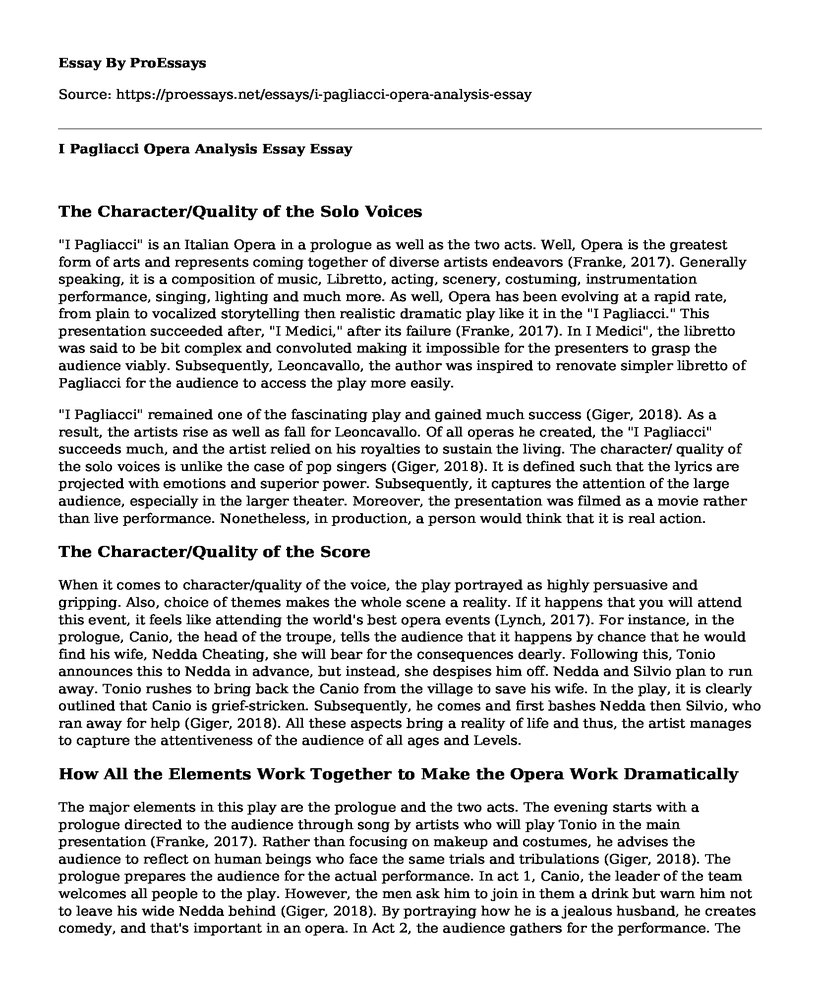The Character/Quality of the Solo Voices
"I Pagliacci" is an Italian Opera in a prologue as well as the two acts. Well, Opera is the greatest form of arts and represents coming together of diverse artists endeavors (Franke, 2017). Generally speaking, it is a composition of music, Libretto, acting, scenery, costuming, instrumentation performance, singing, lighting and much more. As well, Opera has been evolving at a rapid rate, from plain to vocalized storytelling then realistic dramatic play like it in the "I Pagliacci." This presentation succeeded after, "I Medici," after its failure (Franke, 2017). In I Medici", the libretto was said to be bit complex and convoluted making it impossible for the presenters to grasp the audience viably. Subsequently, Leoncavallo, the author was inspired to renovate simpler libretto of Pagliacci for the audience to access the play more easily.
"I Pagliacci" remained one of the fascinating play and gained much success (Giger, 2018). As a result, the artists rise as well as fall for Leoncavallo. Of all operas he created, the "I Pagliacci" succeeds much, and the artist relied on his royalties to sustain the living. The character/ quality of the solo voices is unlike the case of pop singers (Giger, 2018). It is defined such that the lyrics are projected with emotions and superior power. Subsequently, it captures the attention of the large audience, especially in the larger theater. Moreover, the presentation was filmed as a movie rather than live performance. Nonetheless, in production, a person would think that it is real action.
The Character/Quality of the Score
When it comes to character/quality of the voice, the play portrayed as highly persuasive and gripping. Also, choice of themes makes the whole scene a reality. If it happens that you will attend this event, it feels like attending the world's best opera events (Lynch, 2017). For instance, in the prologue, Canio, the head of the troupe, tells the audience that it happens by chance that he would find his wife, Nedda Cheating, she will bear for the consequences dearly. Following this, Tonio announces this to Nedda in advance, but instead, she despises him off. Nedda and Silvio plan to run away. Tonio rushes to bring back the Canio from the village to save his wife. In the play, it is clearly outlined that Canio is grief-stricken. Subsequently, he comes and first bashes Nedda then Silvio, who ran away for help (Giger, 2018). All these aspects bring a reality of life and thus, the artist manages to capture the attentiveness of the audience of all ages and Levels.
How All the Elements Work Together to Make the Opera Work Dramatically
The major elements in this play are the prologue and the two acts. The evening starts with a prologue directed to the audience through song by artists who will play Tonio in the main presentation (Franke, 2017). Rather than focusing on makeup and costumes, he advises the audience to reflect on human beings who face the same trials and tribulations (Giger, 2018). The prologue prepares the audience for the actual performance. In act 1, Canio, the leader of the team welcomes all people to the play. However, the men ask him to join in them a drink but warn him not to leave his wide Nedda behind (Giger, 2018). By portraying how he is a jealous husband, he creates comedy, and that's important in an opera. In Act 2, the audience gathers for the performance. The Canio presents it alongside his troupe. This is a mirror of previous, actual life events. Tonio acts like the stupid Servant while Beppe acts tenor.
References
Franke, L. (2017). The Godfather Part III: Film, Opera, and the Generation of Meaning. In Changing Tunes: The Use of Pre-existing Music in Film (pp. 31-45). Routledge.
Giger, A. (2018). "Svesti la giubba," or, Uncloaking the Genesis of Pagliacci. 19th-Century Music, 41(3), 225-251.
Lynch, C. (2017). Die Zauberflote at the Metropolitan Opera House in 1941: The Mozart Revival, Broadway, and Exile. The Musical Quarterly, 100(1), 33-84.
Cite this page
I Pagliacci Opera Analysis Essay. (2022, Jun 22). Retrieved from https://proessays.net/essays/i-pagliacci-opera-analysis-essay
If you are the original author of this essay and no longer wish to have it published on the ProEssays website, please click below to request its removal:
- Frozen in the Post-Heroic Age Mirrors Female Initiation, Telos Essay
- Narrative Situation of Story Paper Example
- Towards a Regional Sustainable City: An Appraisal of Environmental Architecture Development in Shanghai
- Essay Example on Dodgeball: A True Underdog Story - A Comedic Tale of Triumph
- Essay Example on The Poor and Governance: Slums Across the Globe
- Essay Example on Henri Labrouste: A Revolutionary Designers Work of Art and Technology
- Annie Oakley: West America - Movie Review Sample







